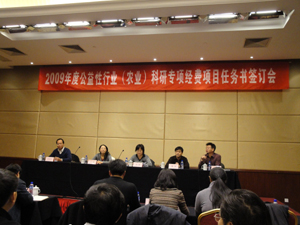|
The endorsement ceremony of special funds for national commonweal research projects, sponsored by the Department of Sci-Tech Education of Agriculture Ministry, was held in Beijing, Nov. 19, 2009.
Two projects in agricultural sector, called the research and demonstration of integrated techniques for high-efficient agricultural utilization of salty-alkalized lands and the research and demonstration of integrated techniques for green agricultural production and recycling use of countryside wastes, were approved to be undertaken by the ISSAS for the first time, and would be launched recently.
The research and demonstration of integrated techniques for high-efficient agricultural utilization of salty-alkalized lands is the first national research project on the utilization of salty-alkalized lands in recent years, with the chief expert, Prof. YANG Jingsong (fellow researcher, ISSAS). The project aims to systematically develop the key techniques for high-efficient agricultural utilization of salty-alkalized lands in China, to construct the technological models for high-efficient agricultural utilization of salty-alkalized lands applicable in the northeastern, northwestern, and coastal areas of the country, and the upper and middle reaches of the Yellow River and the Huang-Huai-Hai Plain, and to improve the integral technological capabilities of using and managing large-scale salty-alkalized lands. With the practices of relative work, the ability and efficiency of utilizing the salty-alkalized lands will be greatly enhanced, and the total amount of national agricultural resources will be expanded, as well as the stockpile of backup arable land be increased. Nearly 30 domestic organizations involved in this project.
The research and demonstration of integrated techniques for green agricultural production and recycling use of countryside wastes, with the chief expert, Prof. YANG Linzhang (fellow researcher, ISSAS), will focus on the formation of new development models for the rural economy to elevate the quality of agricultural products, safeguard the security of agricultural products, and improve the rural eco-environment through the reduction of chemical input, application of environmental-friendly substances, detailed management of manufacturing processes, mitigation of pollutant emission and recycling use of countryside wastes.

|
